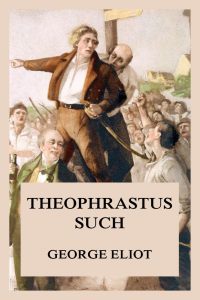Theophrastus Such – George Eliot
Wherever Mrs. Eliot places her touch, she leaves the impression of the profound insight, the serene wisdom, the fine observation, and the subtle humor which so graciously signalize her nature. The short essays in this book are stamped with all of the writer’s peculiarities of thought and style, and are witty, suggestive, and delightful. The book is studded with fine thoughts and fine expressions. It is the peculiar characteristic of George Eliot’s observations—and one exemplified in this her last work perhaps more than in any previous one—that she always puts in the best language thoughts which appear to have been in the reader’s mind often before. In these pages they are crystallized.
Theophrastus Such.
ISBN: 9783849673901.
Available at amazon.com and other venues.
A short biography of George Eliot (from Wikipedia):
Mary Anne Evans (22 November 1819 – 22 December 1880), known by her pen name George Eliot, was an English novelist, poet, journalist, translator and one of the leading writers of the Victorian era. She is the author of seven novels, including Adam Bede (1859), The Mill on the Floss (1860), Silas Marner (1861), Middlemarch (1871–72), and Daniel Deronda (1876), most of which are set in provincial England and known for their realism and psychological insight.
She used a male pen name, she said, to ensure that her works would be taken seriously. Female authors were published under their own names during Eliot’s lifetime, but she wanted to escape the stereotype of women’s writing being limited to lighthearted romances. She also wanted to have her fiction judged separately from her already extensive and widely known work as an editor and critic. Another factor in her use of a pen name may have been a desire to shield her private life from public scrutiny, thus avoiding the scandal that would have arisen because of her adulterous relationship with the married George Henry Lewes.
Eliot’s Middlemarch has been described by Martin Amis and Julian Barnes as the greatest novel in the English language.
(The text of the last section was taken from a Wikipedia entry and is available under the Creative Commons Attribution-ShareAlike License.)
Publisher’s Note: This book is printed and distributed by Createspace a DBA of On-Demand Publishing LLC and is typically not available anywhere else than in stores owned and operated by Amazon or Createspace.

